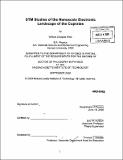STM studies of the nanoscale electronic landscape of the cuprates
Author(s)
Wise, William Douglas
DownloadFull printable version (13.38Mb)
Alternative title
Scanning tunneling microscopy studies of the nanoscale electronic landscape of the cuprates
Other Contributors
Massachusetts Institute of Technology. Dept. of Physics.
Advisor
Eric W. Hudson.
Terms of use
Metadata
Show full item recordAbstract
Scanning tunneling microscopy (STM) studies of the high-T superconductors have led to a number of important discoveries. In particular, STM has revealed spatial patterns in electronic density due to phenomena such as checkerboard order and quasiparticle interference. This thesis presents two studies of these patterns and their implications. In the first, I present a doping and temperature dependent study of checkerboard order in the cuprate superconductor Bi2Sr 2CuO6+x (Bi-2201). The main result, that the wavelength of checkerboard order increases with doping and is independent of temperature, is consistent with a charge density wave origin of the checkerboard and is inconsistent with many other theories. The second study examines local properties of checkerboard order and of quasiparticle interference patterns in Bi-2201 and the related superconductor Bi 2Sr 2CaCu2Os+x (Bi- 2212). Both of these phenomena are tied to the doping of the material via the configuration of the Fermi surface. I find local variation in both checkerboard order wavelength and in the quasiparticle interference patterns. These variations are consistent with local variations in Fermi surface properties. The discovery of local variations in Fermi surface provides a new way of thinking about other inhomogeneous properties of the cuprates and of inhomogeneous materials in general.
Description
Thesis (Ph. D.)--Massachusetts Institute of Technology, Dept. of Physics, 2009. Cataloged from PDF version of thesis. Includes bibliographical references (p. 57-59).
Date issued
2009Department
Massachusetts Institute of Technology. Department of PhysicsPublisher
Massachusetts Institute of Technology
Keywords
Physics.